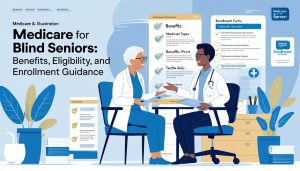If you’ve received a check in the mail from something called “Senior Check Benefits” with a Boise, Idaho address, you’re not alone. Thousands of seniors across the country have gotten these mailings, and many are wondering: Is this legitimate? Should I deposit this check?
Here’s what you need to know to protect yourself and your personal information.
What Is Senior Check Benefits?
Senior Check Benefits is a marketing company that sends small checks (typically $5-10) to seniors with instructions requiring you to write your phone number on the back to deposit the check. The letter often mentions final expense life insurance programs or funeral benefit coverage up to $35,000 or $50,000.
Here’s how it works: When you deposit the check with your phone number, you’re essentially giving permission for insurance agents to contact you. By depositing the check, you’re requesting information and an agent may contact you. Several people have reported that after cashing these checks, insurance agents showed up at their door unannounced.
Is Senior Check Benefits a Scam?
It’s not technically illegal, but the Better Business Bureau’s digital campaign manager describes it as “not super straight-forward but it’s not illegal, it’s just a little bit, maybe, shady”. The company has an F rating with the Better Business Bureau and has failed to respond to multiple consumer complaints.
The bigger concern: This tactic can also be used by actual scammers. Once they have your phone number and know you’re willing to engage with unsolicited offers, you could become a target for more aggressive fraud attempts.
Red Flags to Watch For
Several warning signs should make you think twice about this offer:
No Contact Information – There’s no phone number, website, or mailing address listed—just a P.O. box in Boise, Idaho. Legitimate companies provide multiple ways to contact them.
Requires Your Phone Number to Cash – Why would a check require your personal contact information to deposit? This is a data collection tactic, plain and simple.
Vague Promises – The mailings mention large death benefits or funeral expense coverage but provide no specifics about actual insurance products, premiums, or qualifying criteria.
“Too Good to Be True” Offers – Promises of $35,000 to $50,000 in tax-free funeral benefits with no clear explanation of what you’re actually signing up for.
Requires Your Phone Number to Cash – Why would a check require your personal contact information to deposit? This is a data collection tactic, plain and simple.
Vague Promises – The mailings mention large death benefits or funeral expense coverage but provide no specifics about actual insurance products, premiums, or qualifying criteria.
“Too Good to Be True” Offers – Promises of $35,000 to $50,000 in tax-free funeral benefits with no clear explanation of what you’re actually signing up for.
Should You Cash the Check?
My recommendation: Don’t do it. The BBB advises asking yourself: “Your personal, private information for a $5 or $10 check? Is it worth it?”
That small check isn’t free money—it’s a down payment on accessing your contact information and opening the door to aggressive sales tactics or potential fraud.
That small check isn’t free money—it’s a down payment on accessing your contact information and opening the door to aggressive sales tactics or potential fraud.
What Happens If You Already Cashed It?
If you’ve already deposited one of these checks, here’s what to do:
Be Prepared for Contact – Insurance agents may call or even show up at your home. You’re under no obligation to speak with them or purchase anything.
Don’t Share Additional Information –Never provide your Social Security number, Medicare number, bank account details, or any other sensitive information to unsolicited callers.
Monitor Your Accounts – Keep an eye on your bank accounts and credit reports for any unusual activity.
Report Unwanted Contact – If agents become aggressive or harassing, you can file a complaint with your state insurance department or the Federal Trade Commission.
Be Prepared for Contact – Insurance agents may call or even show up at your home. You’re under no obligation to speak with them or purchase anything.
Don’t Share Additional Information –Never provide your Social Security number, Medicare number, bank account details, or any other sensitive information to unsolicited callers.
Monitor Your Accounts – Keep an eye on your bank accounts and credit reports for any unusual activity.
Report Unwanted Contact – If agents become aggressive or harassing, you can file a complaint with your state insurance department or the Federal Trade Commission.
Legitimate Senior Benefits That Actually Exist
There ARE real government and insurance programs designed to help seniors—you just won’t find them through unsolicited checks in the mail. Here are legitimate resources:
Medicare Savings Programs –These state programs help pay Medicare premiums, deductibles, and copayments for people with limited income. You apply through your state Medicaid office, not through a check in the mail.
Extra Help with Prescription Drugs – The Social Security Administration offers a program that helps with Medicare Part D costs. You can apply at ssa.gov or by calling 1-800-772-1213.
Final Expense Insurance – This is real insurance coverage, but you purchase it through licensed agents after comparing multiple options—not by cashing a random check.
Social Security Death Benefit –This provides a one-time $255 payment to eligible surviving spouses or children when someone passes away. It’s processed through Social Security when you report a death, not through third-party marketing companies.
Supplemental Security Income (SSI) – If you’re 65 or older with limited income and resources, you may qualify for SSI payments. You apply directly through Social Security.
Medicare Savings Programs –These state programs help pay Medicare premiums, deductibles, and copayments for people with limited income. You apply through your state Medicaid office, not through a check in the mail.
Extra Help with Prescription Drugs – The Social Security Administration offers a program that helps with Medicare Part D costs. You can apply at ssa.gov or by calling 1-800-772-1213.
Final Expense Insurance – This is real insurance coverage, but you purchase it through licensed agents after comparing multiple options—not by cashing a random check.
Social Security Death Benefit –This provides a one-time $255 payment to eligible surviving spouses or children when someone passes away. It’s processed through Social Security when you report a death, not through third-party marketing companies.
Supplemental Security Income (SSI) – If you’re 65 or older with limited income and resources, you may qualify for SSI payments. You apply directly through Social Security.
How to Protect Yourself from Senior-Targeted Scams
These mailings are just one example of how scammers and aggressive marketers target older adults. Here’s how to stay safe:
Never Share Personal Information Without Verification – Your Medicare number, Social Security number, and bank account information should only go to organizations you’ve contacted directly and verified.
Be Skeptical of Unsolicited Offers –Whether it’s a check, a phone call, or someone at your door, be cautious about offers you didn’t request.
Verify Before You Act – If someone claims to represent Medicare, Social Security, or an insurance company, hang up and call the official number yourself. Don’t use contact information they provide.
Trust Your Instincts –If something feels off or too good to be true, it probably is. There’s no shame in saying “no” or “let me think about it.”
Consult Trusted Advisors – Before making any insurance or financial decisions, talk to people you trust—family members, your doctor, or an independent insurance agent with an established local presence.
Never Share Personal Information Without Verification – Your Medicare number, Social Security number, and bank account information should only go to organizations you’ve contacted directly and verified.
Be Skeptical of Unsolicited Offers –Whether it’s a check, a phone call, or someone at your door, be cautious about offers you didn’t request.
Verify Before You Act – If someone claims to represent Medicare, Social Security, or an insurance company, hang up and call the official number yourself. Don’t use contact information they provide.
Trust Your Instincts –If something feels off or too good to be true, it probably is. There’s no shame in saying “no” or “let me think about it.”
Consult Trusted Advisors – Before making any insurance or financial decisions, talk to people you trust—family members, your doctor, or an independent insurance agent with an established local presence.
The Right Way to Shop for Final Expense Insurance
If you’re genuinely interested in final expense or burial insurance (which many seniors are), there’s a right way to approach it:
Work with a Local, Licensed Agent –Choose someone you can meet in person, who has an established business, and who represents multiple insurance companies.
Compare Multiple Options – Don’t buy the first policy presented to you. Look at coverage amounts, premiums, waiting periods, and company ratings.
Read Everything Carefully –Understand exactly what you’re purchasing, what it costs, and what’s covered before signing anything.
Ask Questions –A good agent will answer all your questions without pressure and give you time to make a decision.
Check for Complaints –Look up the agent and insurance company with the Better Business Bureau and your state insurance department.
Work with a Local, Licensed Agent –Choose someone you can meet in person, who has an established business, and who represents multiple insurance companies.
Compare Multiple Options – Don’t buy the first policy presented to you. Look at coverage amounts, premiums, waiting periods, and company ratings.
Read Everything Carefully –Understand exactly what you’re purchasing, what it costs, and what’s covered before signing anything.
Ask Questions –A good agent will answer all your questions without pressure and give you time to make a decision.
Check for Complaints –Look up the agent and insurance company with the Better Business Bureau and your state insurance department.
The Bottom Line
“Senior Check Benefits” mailings are a marketing tactic designed to collect your contact information and sell you insurance products. While not technically illegal, they’re misleading and can open the door to aggressive sales tactics or worse.
If you receive one of these checks, the safest move is to shred it and move on. Your personal information is worth far more than $5 or $10.
If you’re actually in the market for final expense insurance or confused about what benefits you might qualify for, the better approach is to reach out to a trusted, local insurance professional who can walk you through your options without gimmicks or pressure.
If you receive one of these checks, the safest move is to shred it and move on. Your personal information is worth far more than $5 or $10.
If you’re actually in the market for final expense insurance or confused about what benefits you might qualify for, the better approach is to reach out to a trusted, local insurance professional who can walk you through your options without gimmicks or pressure.
Questions About Legitimate Senior Benefits in New York?
I’ve been helping New Yorkers navigate Medicare and insurance options since 2007. If you’re wondering what legitimate benefits and coverage options are available to you—whether that’s Medicare Savings Programs, prescription drug assistance, or final expense insurance—I’m here to provide straight answers with no tricks or pressure.
You deserve honest guidance from someone you can actually reach, not a faceless P.O. box in Idaho.
You deserve honest guidance from someone you can actually reach, not a faceless P.O. box in Idaho.






